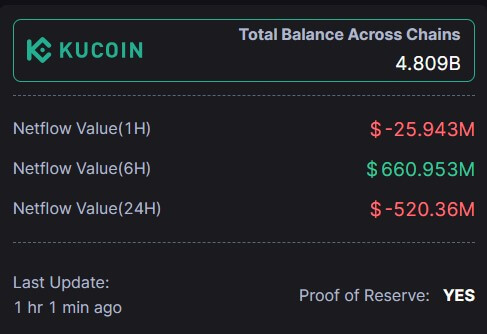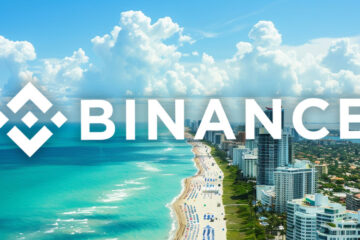Embattled crypto exchange KuCoin endured a surge in withdrawal requests the past day after the US authorities levied criminal charges against the platform.
Data from various on-chain analytics firms, including DefiLlama, Nansen, and SpotOnChain, showed a surge in withdrawals across multiple categories of traders, including whales, funds, smart money, and market makers.
On March 26, the US authorities alleged that the exchange and its founders operated without proper legal permissions and violated bank secrecy and anti-money laundering (AML) laws.
KuCoin withdrawals
The exchange experienced significant withdrawals of Ethereum-based tokens during the reporting period.
SpotOnChain reported withdrawals totaling approximately $500 million, encompassing $274 million USDT, 15,500 ETH (approximately $55 million), 50 million ONDO tokens (roughly $46 million), and 12 million FET ($34 million), among others.
Similarly, the 0xscope dashboard places total net outflows from KuCoin at $520 million during the reporting period.

Additionally, blockchain sleuth LookonChain identified two whale accounts that collectively moved $86 million USDT to platforms like OKX and Bybit.
Amid the withdrawals, numerous users reported delays, sparking concerns reminiscent of the FTX collapse.
However, CryptoQuant CEO Ki Young Ju doused these worries, saying the platform possesses adequate reserves to process withdrawals while emphasizing that KuCoin does not mix customers’ funds.
He said:
“On-chain wise, KuCoin is fine. BTC and ETH withdrawals surged, driven mainly by retail users, with a small impact on the overall reserve. They appear to not commingle customers’ funds and have sufficient reserves to process user withdrawals.”
DefiLlama CEX transparency dashboard shows that the exchange’s wallets still hold assets worth $3.68 billion as of press time.
Touts compliance
KuCoin CEO Johnny Lyu said the exchange’s legal battles are not unique but “typical growth and regulatory issues encountered by emerging industries.”
According to him:
“Early-stage development often sees regulatory gaps, but as the industry matures, we move towards and embrace compliance and standardization.”
He pointed out that the platform recently became the first global exchange to register in India, adding that this reflects the platform’s “respect for local regulations and a proactive approach to compliance.”
Lyu reiterated that the exchange continues to operate optimally and that the firm’s lawyers were investigating the details of the allegations.
 Bitcoin
Bitcoin  Ethereum
Ethereum  Tether
Tether  XRP
XRP  USDC
USDC  TRON
TRON  Lido Staked Ether
Lido Staked Ether  Dogecoin
Dogecoin  Figure Heloc
Figure Heloc  Cardano
Cardano  Bitcoin Cash
Bitcoin Cash  Wrapped stETH
Wrapped stETH  WhiteBIT Coin
WhiteBIT Coin  Wrapped Bitcoin
Wrapped Bitcoin  Wrapped eETH
Wrapped eETH  USDS
USDS  Chainlink
Chainlink  Binance Bridged USDT (BNB Smart Chain)
Binance Bridged USDT (BNB Smart Chain)  Monero
Monero  LEO Token
LEO Token  WETH
WETH  Stellar
Stellar  Coinbase Wrapped BTC
Coinbase Wrapped BTC  Sui
Sui  Ethena USDe
Ethena USDe  Zcash
Zcash  Litecoin
Litecoin  Avalanche
Avalanche  Hyperliquid
Hyperliquid  Shiba Inu
Shiba Inu  Hedera
Hedera  Canton
Canton  USDT0
USDT0  sUSDS
sUSDS  World Liberty Financial
World Liberty Financial  Dai
Dai  Toncoin
Toncoin  Cronos
Cronos  Ethena Staked USDe
Ethena Staked USDe  PayPal USD
PayPal USD  Polkadot
Polkadot  Uniswap
Uniswap  USD1
USD1  Mantle
Mantle  Rain
Rain  MemeCore
MemeCore  Bittensor
Bittensor  Aave
Aave 


